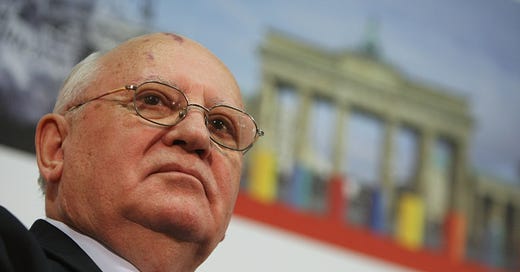The politician who changed our lives. Even if he didn’t mean to
A reflection on Mikhail Gorbachev's legacy.
By Andrei Kozenko
The first and last President of the USSR, Mikhail Gorbachev, died in his 92nd year late in the evening of August 30th 2022. A man whom we will be unable to understand properly even a century from now. For some, of course, he destroyed the magnificent Soviet Union. Others say they owe him their freedom.
Was Mikhail Gorbachev one of the most important politicians of the 20th century? Yes, that’s true. Was Gorbachev weaker than his opponents? Certainly. Did Gorbachev’s policies destroy the ‘Evil Empire’? Sure: anyone in the West can tell you that. Did Gorbachev’s policies collapse the Soviet Union? Also, utterly true: several generations ulcered by such vanities form the fuel that flames the war between Russia and Ukraine.
Just recall Putin’s description of the end of the USSR – ‘the greatest geopolitical catastrophe’…
Did Gorbachev give peoples their freedom? It is true. Did Gorbachev deny peoples their freedom, and did his strongmen open fire on peaceful demonstrators? That’s also true: people in Alma-Ata, Vilnius, Riga, Tbilisi and Baku still remember it well.
One more question that’s important: did Gorbachev desire the destruction of the USSR, the shooting of demonstrators, and the horrific poverty of his own fellow citizens? Of course, he didn’t. But he could no longer control the consequences of his own policies.
There’s one way of weighing it all up, which is unobjective, yet indisputable. It’s called personal experience.
In the late 1980s, even an ordinary, Soviet, provincial child was well aware that something incredible was happening in his country. TV programmes like ‘Perestroika Projector’, ‘View’ and ‘Before and After Midnight’ kept tipping a ton of information on top of your head.
The so-called ‘fat journals’ like ‘Novy Mir’, ‘Znamya’ and ‘Oktyabr’ – they made postmen curse their choice of employment. Our family subscribed to six of them, and we weren’t the only ones. Because that’s where they published Solzhenitsyn, Voinovich, Bulgakov…
“Lads, did you know there’s a group in Leningrad called ‘Alisa’? Apparently they’re satanists. But the songs are bloody amazing!”, schoolmates would say.
“Did you see that new band on ‘View’ last night? The singer had eyeliner on! He was singing a song, like: ‘My brother Cain was in a distant land, saving the kids and the prophets… My brother Cain, he came back again, to save our land from masons and rockers…’ Guys! It’s about Afghanistan!”, I shot right back.
“Andrei, in the new issue of Znamya there’s a story by some bloke called Dovlatov. You reckon you’re going to be a journalist. Read it. You might like it,” I heard at home.
Between school and getting home, I’m going to spend an hour and half in a queue with food tokens stuffed in my jacket pocket. This month, the ration was down to a kilo of butter a month and three kilos of sugar. The days when our fridge contained both cheese and sausage were considered fortunate. Yet we carried on living like everyone else. Shabbily.
Grandma recalled bits of a TV report about Gorbachev meeting Reagan in Geneva. I didn’t understand the whole of it, not by far, but I do recall that the main fear of my childhood’s generation relented a little – the fear of a nuclear war. At the same time, of course, Grandma took a pop at Gorbachev’s wife, Raisa: ‘well now, who’s dressing so fancily?’
I watched Tatiana Mitkova on the television news who boldly, and apparently without any fear, said she wasn’t going to broadcast the official news about the dispersal of demonstrators in Vilnius, the Lithuanian capital. It was all totally untrue, and people had actually died there, she said.
Of course, she was sacked, and the next time I saw her was on another TV channel, NTV, in another country: Russia.
In linguistics, there’s a thing called a ‘seme’. It’s what allows us to link different words, and groups of words. And in terms of semantics, these multi-faceted, funny and tragic events are united by one word alone: the word is ‘freedom’. That’s thanks to the man whom we know as Mikhail Gorbachev.
He travelled the road from popular adoration to hatred very quickly. Six years was all. I lauded Gorbachev for his first three years. And then hated him, when he stepped off a plane, wearing some crappy clothes, at the end of the coup attempt in August 1991.
But I began to love and respect Gorbachev with each year that I grasped the scale of what he had managed to achieve in his time.
Let another century go by, and anyone who thinks they can pass judgement on Gorbachev unequivocally will still be knowingly biased.
Returning to personal experience, and standing now as an adult on my childish plinth, I’ve made up my mind: you can gain and lose any number of material goods. But there’s one thing you can never lose: freedom.
Which has led to a paradoxical outcome: I live in a free country, though it’s not called Russia.
Gorbachev gave the citizens of the Soviet Union more freedom than they had seen in the 20th century. But how we chose to use it: well, let’s admit - that was always up to us.
Translated by Chris Booth.
Read this story in Russian here.




